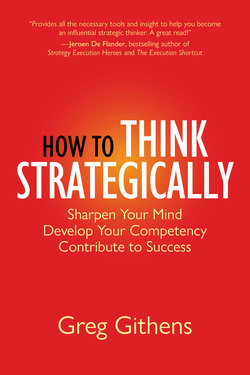Читать книгу How to Think Strategically - Greg Githens - Страница 8
На сайте Литреса книга снята с продажи.
ОглавлениеFIGURES
1-1 An example of pictorial ambiguity. Can you see the two faces?
1-2 Characteristics of a reasonable person.
1-3 An example of celebrating action over thoughtfulness.
2-1 A five-part template for writing strategy, originating from collective beliefs, choices, and adaptations.
2-2 A discontinuity may (or may not) trigger a chaotic, large-scale effect.
2-3 Many people tend to narrow frame and set goals.
3-1 The four pillars of strategic thinking.
3-2 Strategic thinking shares some but not all characteristics with other styles of thinking.
3-3 The four X-factors of strategic thinking.
4-1 The quest narrative archetype is one where the protagonist leaves the ordinary to enter the special world.
4-2 The microskill of reflection guides the progression to competence and mastery.
4-3 The microskills of strategic thinking. The last eight are introduced in later chapters.
5-1 The strategic thinking map and the operational thinking map.
5-2 Process strengthens operational aspirations and enhances focus on the present.
5-3 Find shared landmarks and use them as a bridge from the operations thinking map to the strategic thinking map.
6-1 A depiction of strategy from the fuzzy front end into action.
7-1 The three horizons.
7-2 The three horizons have implications for strategy.
7-3 The three horizons, prevalence, and strategic fit.
7-4 Example scenario.
8-1 Strategic fit for IBM as a dynamic concept.
8-2 A framework for strategic decisions and tactical decisions, with an example from IBM.
9-1 The ladder of inference, with elements of insights.
10-1 Helpful questions and concepts for developing perspective.
11-1 Two shoulder angels.
12-1 In a dyad, each person shares her perspective and discovers areas of agreement and disagreement.
